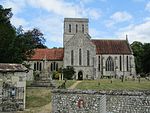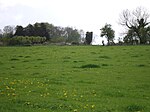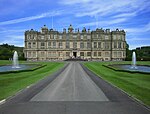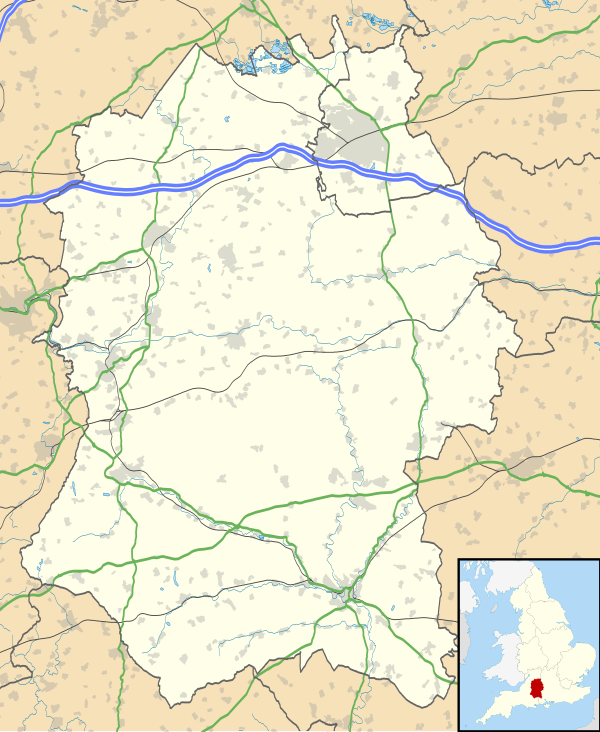List of monastic houses in Wiltshire
Appearance
(Redirected from Charlton Priory)
Locations of monastic houses in Salisbury
The following is a list of the monastic houses in Wiltshire, England.
Alien houses are included, as are smaller establishments such as cells and notable monastic granges (particularly those with resident monks), and also camerae of the military orders of monks (Knights Templar and Knights Hospitaller). Monastic hospitals are included where they had the status or function of an abbey, priory, or preceptor/commandery.
- Abbreviations and key
| Symbol | Status |
|---|---|
| None | Ruins |
| * | Current monastic function |
| + | Current non-monastic ecclesiastic function (including remains incorporated into later structure) |
| ^ | Current non-ecclesiastic function (including remains incorporated into later structure) or redundant intact structure |
| $ | Remains limited to earthworks etc. |
| # | No identifiable trace of the monastic foundation remains |
| ~ | Exact site of monastic foundation unknown |
| ≈ | Identification ambiguous or confused |
Locations with names in italics indicate possible duplication (misidentification with another location) or non-existent foundations (either erroneous reference or proposed foundation never implemented) or ecclesiastical establishments with a monastic name but lacking actual monastic connection.
| EH | English Heritage |
| LT | Landmark Trust |
| NT | National Trust |
List
[edit]| Foundation | Image | Communities & Provenance | Formal Name or Dedication & Alternative Names |
OnLine References & Location |
|---|---|---|---|---|
| Amesbury Abbey | 
|
tradition of early monastery destroyed 6th century; Benedictine nuns abbey founded c.979 by Alfrida, widow of King Edwin; Fontevrault Benedictine nuns alien house: dependent on Fontevrault; refounded 1177; Henry II obtained papal consent, abbess pensioned and nuns apparently expelled to other houses 1177, being replaced by nuns from Fontevrault and Westwood; Fontevrault Benedictine nuns and brothers double house priors recorded from 1194; became denizen: independent from sometime after 1403; dissolved 1539; granted to Edward, Earl of Hertford 1540/1; hypothesis that the current parish church was the church of the brethren, possibly built on the site of the early minster |
Abbey of St Mary and St Melor (c.979) ____________________ Amesbury Priory |
[1][2] 51°10′28″N 1°47′08″W / 51.1745305°N 1.7855063°W |
| Ansty Preceptory ^(?) | Knights Hospitaller founded c.1220, manor granted by William de Turberville (Tubelville) 1210–1; dissolved 1540; granted to J. Zouch 1546/7; in use as a hospice after dissolution; badly damaged by fire 1927; converted into an engineering workshop; remains possibly incorporated into farmhouse at Manor Farm |
[3][4] 51°02′11″N 2°03′50″W / 51.0364945°N 2.0639665°W | ||
| Avebury Priory | Benedictine monks alien house: cell dependent on St-Georges, Bocherville; founded after 1114 by William de Tancarville (Tancervilla); dissolved 1378; granted to Winchester College 1391; granted to Sir William Sharington 1548/9; manor house named Avebury Manor built on site c.1557 |
[5][6] 51°25′44″N 1°51′32″W / 51.429016°N 1.8589747°W | ||
| Bradenstoke Priory | 
|
Augustinian Canons Regular founded c.1139 (1142) by Walter D'Evereaux; dissolved 17 January 1539; granted to Richard Pexhall 1546/7; remains within farmstead named 'Bradenstoke Abbey' |
Clack Priory | [7][8] 51°30′44″N 2°00′07″W / 51.5121362°N 2.0020169°W |
| Bradford-on-Avon Monastery | Benedictine? monks founded c.705–710 by St Aldhelm, Bishop of Sherborne; granted to Shaftesbury, Dorset 1001; served as charnel house in medieval period; in use as a dwelling and a school 18th to mid-19th century; restored 1870; church now in ownership of the Wiltshire Archaeological Society |
St Lawrence | [9] 51°20′49″N 2°15′14″W / 51.3470125°N 2.2538334°W | |
| Briontune Priory | Augustinian Canons Regular[note 1] | St Mary Magdalene ____________________ Brioptune Priory |
||
| Britford Monastery (?) | possible Saxon community | |||
| Bromham Monastery | uncertain order and foundation | |||
| Calne Monastery (?) | possible Saxon community | |||
| Charlton Priory | Premonstratensian Canons alien house: dependent on L'Isle-Dieu, Normandy founded c.1187, granted to L'Isle-Dieu by Reginald de Pavely; dissolved 1380; granted to the Hospital of St Katherine-by-the-Tower granted to Sir William Sharington 1548/9 |
Charleton Priory | [10] 51°18′11″N 1°50′37″W / 51.3030161°N 1.8435279°W | |
| Clatford Priory | Benedictine monks alien house: cell dependent on St-Victor-en-Caux; founded after 1104; manors granted by Hugh, son of Ralph de Mortimer; dissolved c.1439; granted to Eton College 1441 |
Clatford and Hullavington Priory | [11][12] 51°24′39″N 1°47′08″W / 51.410831°N 1.7856887°W | |
| Corsham Priory + | possibly late Saxon minster; St Bartholomew's church granted to St-Etienne, Caen by William the Conqueror; Benedictine monks alien house: cell dependent on Marmoutier; founded before 1077, granted to Marmoutier between 1068 and 1135 (during the reign of Henry I); dissolved 1294; administered by the Cluniacs at Tickford, ceasing as a priory, granted to King's College, Cambridge by Henry VI; granted to Syon Abbey by Edward VI; granted to Philip Moore 1608/9; restored by G. E. Street and C. F. Hansom 1875–8 |
Cosham Priory | [13][14] 51°26′02″N 2°10′56″W / 51.4338538°N 2.1823123°W | |
| Cricklade Monastery (?) | possible Saxon monks or secular community | St Sampson | ||
| Damerham Monastery | Historical county location. See entry under List of monastic houses in Hampshire | |||
| Easton Priory or Hospital, Easton Royal ~ | Trinitarian hostel founded 1245 by Stephen of Tisbury, Archdeacon of Salisbury; priory founded 1251, priory church serving as both conventual and parochial; destroyed by fire 1493; apparently restored buildings were reported as in a ruinous state at dissolution; dissolved 1536; granted to Sir Edward Seymour, Viscount Beauchamp 1536; granted to Edward, Earl of Hertford 1608/9; present parish church possibly stands on or near the site of the conventual church |
Eston Friary |
[15][16][17] 51°20′32″N 1°42′15″W / 51.3422846°N 1.704163°W (possible) | |
| Edington Priory + | 
|
manor granted to the nuns at Romsey by King Edgar between 959 and 975; present church built as a chantry chapel 1351 by William Edington, Bishop of Winchester on site of earlier church; Bonshommes brothers[note 2] church granted to the Bonshommes 1358 as their priory church, nave reserved for parochial use; dissolved 1539; granted to William Pawlet, Lord St John 1541/2; conventual church, restored 1881–91, now in parochial use as All Saints' parish church; house named 'The Priory' possibly incorporates remains of the claustral buildings |
St Mary, St Catherine and All Saints ____________________ All Saints' Church Edindon Priory |
[18][19][20] 51°16′44″N 2°06′25″W / 51.2789108°N 2.1068752°W |
| Fisherton Anger Friary | Dominican Friars (community founded 1245 at Fugglestone); transferred here 1281; dissolved 1538 |
|||
| Fugglestone Priory | Dominican Friars founded 1245; transferred to Fisherton Anger 1281 and thereafter retained as a cell until dissolution; dissolved 1538; apparently converted to domestic use when recorded early-19th century, when at least partly extant |
[21] 51°04′55″N 1°51′20″W / 51.0820013°N 1.8556152°W | ||
| Great Bedwyn Monastery (?) | apparent Saxon minster community 10th century, purported traces to the east of present parish church of St Mary, which is possibly on or near site of the Saxon foundation | St Lawrence | [22] 51°22′37″N 1°36′09″W / 51.3768402°N 1.6026306°W (possible) | |
| Hullavington Grange (?) | Benedictine monks founded 1104; dissolved after 1325 |
|||
| Ivychurch Priory | Saxon minster apparently established as priory church; Augustinian Canons Regular founded before 1154 by King Stephen[note 3]; dissolved 1536 |
The Blessed Virgin Mary | [23][24] 51°02′53″N 1°44′26″W / 51.0479184°N 1.7405954°W | |
| Kington St Michael Priory | Benedictine nuns founded before 1155, probably by the family of Robert Wayfer de Brinton who granted land; dissolved 1536; granted to Sir John Long 1538/9; site now within farm |
The Priory Church of St Mary, Kington St Michael ____________________ Keinton Priory |
[25][26] 51°29′57″N 2°09′18″W / 51.4992184°N 2.1549471°W | |
| Lacock Abbey | 
|
Augustinian Canonesses priory founded 1230-2 by Ela, Countess of Salisbury, widow of William Longspée, confirmed 1320; raised to abbey status 1239–40 dissolved 21 January 1539; granted to Sir William Sharington 1540/1; (NT) |
The Abbey Church of the Blessed Virgin Mary and Saint Bernard, Lacock | [27][28] 51°24′52″N 2°07′02″W / 51.4145582°N 2.1171695°W |
| Longleat Priory | 
|
Augustinian Canons Regular founded before 1233 dissolved 1529; granted to Sir John Thynne 1540/1; country house named 'Longleat House' built on site |
[29][30] 51°11′09″N 2°16′28″W / 51.185732°N 2.2743255°W | |
| Loxwell Abbey # | Cistercian monks dependent on Quarr, Isle of Wight founded 1151 by Empress Matilda, her son Henry and her chamberlain Drogo; dissolved 1154; transferred to Stanley |
[31] 51°25′40″N 2°04′09″W / 51.4276413°N 2.0691311°W | ||
| Maiden Bradley Priory | originally a Lazer House founded 1152 (before 1164) by Manasser Biset; hospital for leper women in the care of secular brothers and priests; Augustinian Canons Regular founded 1184: granted by Bishop Hubert 1183–93[note 4]; priory founded before 1201[note 5]; dissolved 1536; granted to Sir Edward Seymore 1537/8 |
The Hospital and Priory Church of the Blessed Virgin Mary and Saint Lazarus, Maiden Bradley ____________________ Mayden Bradeley Priory |
[32][33] 51°09′44″N 2°17′20″W / 51.1621336°N 2.2888067°W | |
| Malmesbury Abbey | 
|
British nuns (legendary) purportedly founded before 603 (7th century); dissolved by St Austin, Archbishop, in, or before, 604; hermitage of Irish monk and hermit Mailduib possibly 637; succeeded by St Aldhelm who built larger church of Our Saviour, SS Peter and Paul after 675; Benedictine? monks founded c.675; secular canons collegiate founded after 796; Benedictine monks founded before 965(−74) (675); destroyed in raids by the Danes 1010; soon rebuilt; refounded before 1143 by William of Malmesbury; dissolved 15 December 1539; granted to William Stump 1544/5; church now in parochial use |
Our Saviour, Saint Peter and Saint Paul, Malmesbury (after 675) St Mary, Virgin (before 1143) |
[34][35] 51°35′05″N 2°05′54″W / 51.5847032°N 2.0983511°W |
| Marlborough Priory | Gilbertine canons founded before 1189(?) possibly by Henry II; plundered and partly destroyed by fire 1337 dissolved January 1539; granted to Anthony Stringer; |
The Priory Church of Saint Margaret, Marlborough ____________________ Marleburgh Abbey |
[36][37] 51°25′05″N 1°43′27″W / 51.4180778°N 1.7242554°W | |
| Marlborough Whitefriars | Carmelite Friars founded c.1316 by John Godwin and William Ramesbesch (Rammeshulle): licence granted 1 January 1316 for William de Rammeshulle to grant land; dilapidated at time of suppression; dissolved 1538; granted to John Pye and Robert Brown 1542/3; demolished 1820; fragments purportedly used in a house named 'the Priory' |
Marleburgh Whitefriars | [38][39] 51°25′10″N 1°43′54″W / 51.4194159°N 1.7317629°W | |
| Monkton Farleigh Priory | Cluniac monks alien house: dependent on Lewes, Sussex; projected by Humphrey de Bohun, probably founded 1120–1123 by his son Humphrey III and wife Maud, confirmed by Hugh, Prior of Lewes; became denizen: independent from sometime during 1373–4; dissolved 1536; granted to Sir Edward Seymore 1536/7; remains incorporated into house built on site 16th century |
St Mary Magdalene ____________________ Farleigh Priory |
[40][41] 51°23′20″N 2°16′47″W / 51.3888478°N 2.2797436°W | |
| Netheravon Monastery (?) | documentary and physical suggestion of pre-Conquest monastic community | |||
| Ogbourne Priory | Benedictine monks alien house: dependent on Bec-Hellouin; founded 1149 (before 1147), granted to Bec by Matilda de Wallingford with the assent of Henry, Duke of the Normans, and his mother Empress Matilda; granted to the Duke of Bedford 1404–5; dissolved 1414; spiritualities transferred to Windsor College 1421; other possessions divided and granted to King's College, Cambridge and Eton College, the London Charterhouse and other establishments |
Ogbourne Saint George Priory | [42][43] 51°27′53″N 1°43′40″W / 51.4646491°N 1.7278683°W | |
| Poulton Priory | Former county location. See entry under List of monastic houses in Gloucestershire | |||
| Rockley Preceptory | Knights Templar founded 1155-6 by John Mareschall; dissolved 1308–12; Knights Hospitaller manor or camera and chapel; dissolved 1541; granted to Sir Thomas Stroude, Walter Erle and John Paget 1544/5 |
Temple Rockley Preceptory | [44][45] 51°26′49″N 1°48′52″W / 51.4468528°N 1.814324°W | |
| Salisbury Blackfriars | Dominican Friars (under the Visitation of London) (community founded 1245 at Wilton) transferred here 1281; dissolved 1538; granted to John Pollard and William Byrte 1544/5 |
[46] 51°04′10″N 1°47′57″W / 51.0695054°N 1.799258°W | ||
| Salisbury Greyfriars | Franciscan Friars Minor, Conventual (under the Custody of London) founded before 1230; dissolved 1538; granted to John Wroth 1544/5 |
[47][48] 51°03′53″N 1°47′30″W / 51.0646545°N 1.7915708°W | ||
| Stanley Abbey | Cistercian monks (community founded at Loxwell 1151); transferred here 1154 by Henry II; largely rebuilt 13th century; dissolved 1536; granted to Sir Edward Bainton 1536/7 |
Stanlegh Abbey | [49][50][51] 51°26′59″N 2°03′17″W / 51.4496912°N 2.0546472°W | |
| Stratton St Margaret Priory (?)[note 6] | Benedictine monks alien house granted to King's College, Cambridge by Henry VI |
|||
| Tisbury Monastery | Saxon Benedictine? monks, possible minster founded before 710; dissolved after 759 land granted to Shaftesbury 984 (983), confirmed by King Ethelred; parish church of St John the Baptist, built 1180–1200, possibly stands on site |
[52] 51°03′44″N 2°04′53″W / 51.0621159°N 2.0812708°W | ||
| Tisbury Grange | Benedictine nuns grange dependent on Shaftesbury; Place Farm currently occupies the site |
[53] 51°03′44″N 2°04′53″W / 51.0621091°N 2.0812735°W | ||
| Upavon Priory | land and churches at Upavon and Sheraton held by St-Wandrille 1086; Benedictine monks alien house: cell dependent on St-Wandrille; founded before 1086: land held by Domesday Survey[note 7]; cell founded by 12th century; dissolved before 1414; granted to Ivychurch 1423; granted to Francis and A. Anderson 1606/7 |
Uphaven Priory | [54][55] 51°17′42″N 1°48′24″W / 51.2948798°N 1.8066059°W | |
| Wilton Abbey | church of St Mary founded by Weohstan, Ealdorman of Wiltshire; nuns founded c.830 (or 773), according to tradition, by petition of Weohstan's widow, Alburga, to King Egbert, to convert church of St Mary into a nunnery refounded 890; refounded 934; Benedictine nuns refounded before 970; destroyed by Sweyn 1003; rebuilt in stone by Edith, wife of Edward the Confessor, consecrated 1065; dissolved 25 March 1539; granted to Sir William Herbert 1543/4; conventual church and buildings demolished; outlying medieval building named 'the Almonry' remains; house named 'Wilton House' built on site. |
St Mary and St Bartholomew St Mary, St Bartholomew and St Edith (after 987) |
[56][57] 51°04′42″N 1°51′33″W / 51.0782284°N 1.8591839°W | |
| Wilton Blackfriars | Dominican Friars (under the Visitation of London) founded 1245; dissolved 1281: transferred to Salisbury and thereafter probably only a vicarial house until 1538 |
[58][59] 51°04′42″N 1°51′33″W / 51.0782284°N 1.8591839°W | ||
See also
[edit]Notes
[edit]- ^ Briontune/Brioptune - cited by Speed and Gervase of Canterbury; Tanner, Notitia Monastica, 609, indicates the county has no location of this name
- ^ Edington – affiliation cited by Discovering Abbeys & Priories, Geoffrey N. Wright and Victoria County History as being one of the only two Bonshommes establishments in England
- ^ Ivychurch - founder cited by Hundred Rolls, 1274
- ^ Maiden Bradley - cited by Leland, Itinerary (ed. T. L. Smith (1910))
- ^ Maiden Bradley - earliest contemporary record of a prior 1201: D. Knowles & N. Hadcock, Medieval Religious Houses: England & Wales, (1971), p.165
- ^ Stratton St Margaret - listed by Dugdale, Monasticon Anglicanum; Tanner, Notitia Monastica annotates quaere ('query')
- ^ Upavon - Victoria County History: A History of the County of Wiltshire: Volume 2, p.119
References
[edit]- ^ Pastscape — Detailed Result: AMESBURY ABBEY
- ^ British History Online — Houses of Benedictine nuns: Abbey, later priory, of Amesbury — Victoria County History: A History of the County of Wiltshire: Volume 3 (pp.242–259)
- ^ Pastscape — Detailed Result: ANSTY HOSPITALLERS PRECEPTORY
- ^ British History Online — House of Knights Hospitaller: Preceptory of Ansty — Victoria County History: A History of the County of Wiltshire: Volume 3 (pp.328–329)
- ^ Pastscape — Detailed Result: AVEBURY MANOR
- ^ British History Online — Alien Houses: Priory of Avebury — Victoria County History: A History of the County of Wiltshire: Volume 3 (pp.392–393)
- ^ Wiltshire Council — Wiltshire Community History Get Church Information
- ^ British History Online — Houses of Augustinian canons: Priory of Bradenstoke — Victoria County History: A History of the County of Wiltshire: Volume 3 (pp.275–288)
- ^ Pastscape — Detailed Result: CHURCH OF ST LAWRENCE
- ^ Pastscape — Detailed Result: CHARLTON PRIORY
- ^ Pastscape — Detailed Result: CLATFORD PRIORY
- ^ British History Online — Alien Houses: Priory of Clatford or Hullavington — Victoria County History: A History of the County of Wiltshire: Volume 3 (pp.393–394)
- ^ Pastscape — Detailed Result: CHURCH OF ST BARTHOLOMEW
- ^ British History Online — Alien Houses: Priory of Corsham — Victoria County History: A History of the County of Wiltshire: Volume 3 (p.394)
- ^ Pastscape — Detailed Result: EASTON PRIORY HOLY TRINITY CHURCH
- ^ Pastscape — Detailed Result: HOSPITAL OF ST MARY MAGDALENE
- ^ British History Online — House of Trinitarians: Priory or hospital of Easton — Victoria County History: A History of the County of Wiltshire: Volume 3 (pp.324–327)
- ^ Pastscape — Detailed Result: CHURCH OF ALL SAINTS
- ^ Pastscape — Detailed Result: THE PRIORY
- ^ British History Online — House of Bonhommes: Edington — Victoria County History: A History of the County of Wiltshire: Volume 3 (pp.320–324)
- ^ Pastscape — Detailed Result: FUGGLESTONE PRIORY
- ^ Pastscape — Detailed Result: CHURCH OF ST MARY THE VIRGIN
- ^ Pastscape — Detailed Result: IVYCHURCH PRIORY
- ^ British History Online — Houses of Augustinian canons: Priory of Ivychurch — Victoria County History: A History of the County of Wiltshire: Volume 3 (pp.289–295)
- ^ Pastscape — Detailed Result: KINGTON ST MICHAEL PRIORY
- ^ British History Online — Houses of Benedictine nuns: Priory of Kington St Michael — Victoria County History: A History of the County of Wiltshire: Volume 3 (pp.259–262)
- ^ Pastscape — Detailed Result: LACOCK ABBEY
- ^ British History Online — Houses of Augustinian canonesses: Abbey of Lacock — Victoria County History: A History of the County of Wiltshire: Volume 3 (pp.303–316)
- ^ Pastscape — Detailed Result: LONGLEAT HOUSE
- ^ British History Online — Houses of Augustinian canons: Priory of Longleat — Victoria County History: A History of the County of Wiltshire: Volume 3 (pp.302–303)
- ^ Pastscape — Detailed Result: LOXWELL ABBEY
- ^ Pastscape — Detailed Result: MAIDEN BRADLEY PRIORY
- ^ British History Online — Houses of Augustinian canons: Priory of Maiden Bradley | A History of the County of Wiltshire: Volume 3 (pp. 295–302)
- ^ Pastscape — Detailed Result: MALMESBURY ABBEY
- ^ British History Online — House of Benedictine monks: Abbey of Malmesbury — Victoria County History: A History of the County of Wiltshire: Volume 3 (pp.210–231)
- ^ Pastscape — Detailed Result: ST MARGARETS PRIORY
- ^ British History Online — Houses of Gilbertine canons: Priory of St Margaret, Marlborough — Victoria County History: A History of the County of Wiltshire: Volume 3 (pp.316–319)
- ^ Pastscape — Detailed Result: MARLBOROUGH WHITEFRIARS
- ^ British History Online — House of Carmelite friars: Marlborough | A History of the County of Wiltshire: Volume 3 (pp. 333–334)
- ^ Pastscape — Detailed Result: MONKTON FARLEIGH PRIORY AND MANOR HOUSE
- ^ British History Online — House of Cluniac monks: Priory of Monkton Farleigh — Victoria County History: A History of the County of Wiltshire: Volume 3 (pp.262–268)
- ^ Pastscape — Detailed Result: OGBOURNE PRIORY
- ^ British History Online — Alien Houses: Priory of Ogbourne — Victoria County History: A History of the County of Wiltshire: Volume 3 (pp.394–396)
- ^ Pastscape — Detailed Result: TEMPLE ROCKLEY TEMPLARS PRECEPTORY
- ^ British History Online — Houses of Knights Templar: Preceptory of Temple Rockley | A History of the County of Wiltshire: Volume 3 (pp. 327–328)
- ^ Pastscape — Detailed Result: SALISBURY BLACKFRIARS
- ^ Pastscape — Detailed Result: SALISBURY GREYFRIARS
- ^ British History Online — Houses of Franciscan friars: Salisbury — Victoria County History: A History of the County of Wiltshire: Volume 3 (pp.329–330)
- ^ Pastscape — Detailed Result: STANLEY ABBEY
- ^ Pastscape — Detailed Result: ABBEY FARM COTTAGE
- ^ British History Online — House of Cistercian monks: Abbey of Stanley — Victoria County History: A History of the County of Wiltshire: Volume 3 (pp.269–275)
- ^ Pastscape — Detailed Result: MONUMENT NO. 210467
- ^ Pastscape — Detailed Result: PLACE FARM
- ^ Pastscape — Detailed Result: UPAVON PRIORY
- ^ British History Online — Alien Houses: Priory of Upavon — Victoria County History: A History of the County of Wiltshire: Volume 3 (pp.396–397)
- ^ Pastscape — Detailed Result: WILTON ABBEY
- ^ British History Online — Houses of Benedictine nuns: Abbey of Wilton — Victoria County History: A History of the County of Wiltshire: Volume 3 (pp.231–242)
- ^ Pastscape — Detailed Result: WILTON BLACKFRIARS
- ^ British History Online — Houses of Dominican friars: Wilton — Victoria County History: A History of the County of Wiltshire: Volume 3 (pp.330–331)
- Bibliography
- Binns, Alison (1989) Studies in the History of Medieval Religion 1: Dedications of Monastic Houses in England and Wales 1066–1216, Boydell [ISBN missing]
- Cobbett, William (1868) List of Abbeys, Priories, Nunneries, Hospitals, And Other Religious Foundations in England and Wales and in Ireland, Confiscated, Seized On, or Alienated by the Protestant "Reformation" Sovereigns and Parliaments
- Knowles, David & Hadcock, R. Neville (1971). Medieval Religious Houses England & Wales. Longman. ISBN 0582112303.
- Morris, Richard (1979) Cathedrals and Abbeys of England and Wales, J. M. Dent & Sons Ltd.[ISBN missing]
- Thorold, Henry (1986) Collins Guide to Cathedrals, Abbeys and Priories of England and Wales, Collins [ISBN missing]
- Thorold, Henry (1993) Collins Guide to the Ruined Abbeys of England, Wales and Scotland, Collins [ISBN missing]
- Wright, Geoffrey N., (2004) Discovering Abbeys and Priories, Shire Publications Ltd. [ISBN missing]
- English Cathedrals and Abbeys, Illustrated, Odhams Press Ltd.
- Map of Monastic Britain, South Sheet, Ordnance Survey, 2nd edition, 1954


